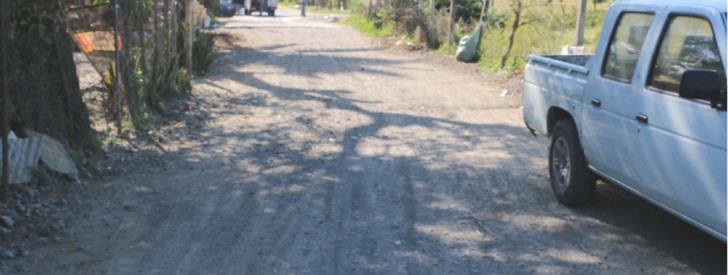 ROAD TO ECONOMIC PROGRESSION. The existing road causes the damage of vegetables through unstable and shaky travel. The 3.7-kiloneter road improvement FMR aims to uplift the living condition of the farmer-beneficiaries in the area.
ROAD TO ECONOMIC PROGRESSION. The existing road causes the damage of vegetables through unstable and shaky travel. The 3.7-kiloneter road improvement FMR aims to uplift the living condition of the farmer-beneficiaries in the area. Better access roads for the vegetable basket
For David Macapagal, farmer and resident in Basang Hamog, Talavera, Nueva Ecija, the way of living in their area has remained relatively slow through the years. Due to the difficulty of accessing to transportation and mobility, the area seems to get overlooked by investors, resulting to a restrained modernization.
Unstable and extremely shaky – that is how Macapagal described the everyday travel from the production sites to the urban areas. The rugged road causes some of the crops to be damaged, thus a decline to his income.
The Improvement of Basang Hamog-Pantoc-Bulac Farm-to-Market Road (FMR) under the Department of Agriculture’s Philippine Rural Development Project (DA-PRDP) will upgrade the existing road into a safe and climate-resilient access that is supportive to agricultural production. Likewise, it will address the constraints on lack of access to efficient technology.
“We are hopeful for the construction of the road. The new road will result to a shorter time in transporting our products like rice and vegetables. We can be able to sell them fresh because of the shorter time of transportation,” he said.
From the farms to the urban market, it takes approximately 1-2 hours to traverse the rough road. Children going to school every day takes 30 minutes on a tricycle ride.
“The construction of the road will be beneficial for all of us – locals, drivers, and students. Due to the roughness of the road, one broken tire usually cost us 600 pesos,” shared Vincent Marcelo, tricycle driver at Pantoc Bulac, Talavera. Marcelo drives three roundtrips a day, at most.
Hardships into benefits
Talavera Mayor Neri Santos-Martinez who expressed her gratefulness to PRDP’s multimillion intervention shared that about 30% of the roads in the municipality currently need rehabilitation.
“The infrastructure surely will improve the quality of our road. Our harvested vegetables will be transported faster to the market, and I believe that the income of our vegetable and palay farmers will increase,” said Martinez.
The municipality of Talavera is considered the vegetable basket of Nueva Ecija, where crops like squash, eggplant, tomato, Ampalaya and onion are being widely grown. Being the 4th highest producer of onion in Nueva Ecija, the municipality immediately held interest with the project upon seeing it through the newspaper.
With World Bank standards and specifications being high and particular, Martinez admits the difficulty of meeting the Project’s compliances.
“Honestly speaking, there have been a lot of hurdles we went through, but the difficulty is not an issue to us. We want to obtain this project because we know how much it will help our farmers.”
Through a series of meetings and planning sessions with various agencies, Talavera was able to come up with proposals with the aim of uplifting the lives of their farmers and locals, including a P17.3M onion enterprise and P60.9M worth of FMRs.
“We coordinated with the region and they immediately responded. They told us the requirements, the things we have to do and we willingly complied with everything.” Martinez continues, “As an agricultural town, 80% of our residents rely on agriculture. We want to give them all programs and services that may help them.”
PRDP is a project of the government for an inclusive, value chain-oriented and climate-resilient agri-fisheries sector, jointly funded by the World Bank, and the national and local government units. (Kayla Arceo, DA-PRDP PSO North Luzon InfoACE Unit)
